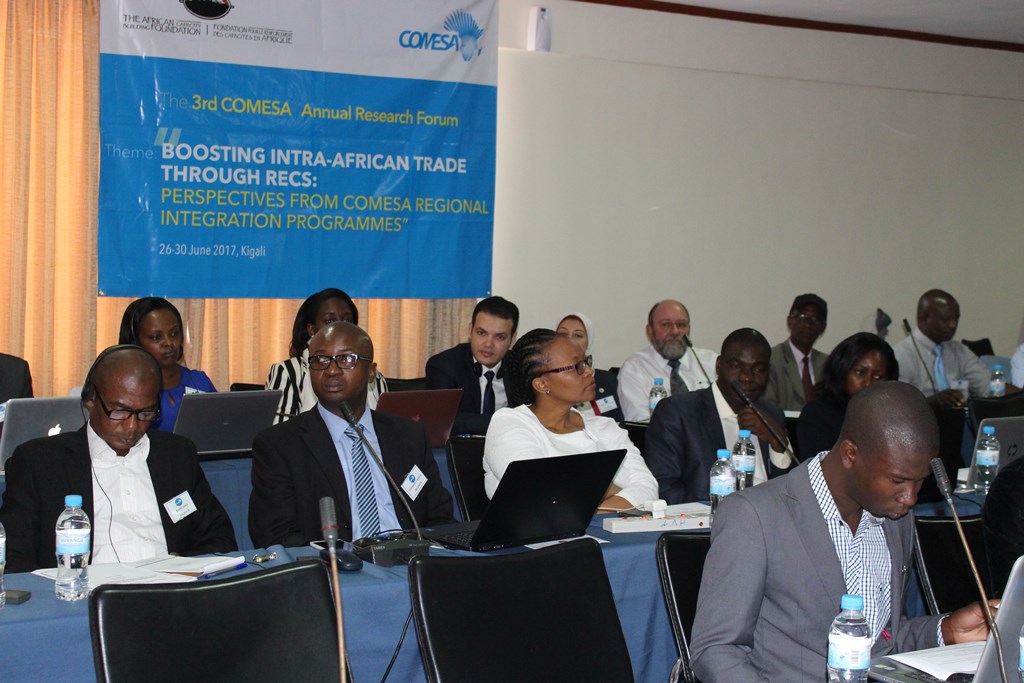
Thursday, September 16, 2021: Over 200 participants drawn from the academia, think tanks, government and the private, the private sector from the region and globally participated in the eighth annual COMESA Research Forum which took place virtually on 13 – 16 September 2021.
The four-day forum received presentations on research papers focusing on regional mitigation strategies against the effects of Covid-19 on intra-COMESA trade and emerging issues. The policy implications from the papers will be presented to the COMESA policy organs meetings to contribute towards policy making decisions.
In addition, country specific research outputs from the forum are expected to directly inform domestic policy reform initiatives in the member states.
The theme of this year’s forum was “Rethinking Trade and Doing Business in the Wake of COVID-19 Pandemic”. Hence, the Forum came up with recommendations that would help the region build resilience around productivity, productive capacities and sustained regional trade even amid the worst of shocks.
Among them were strategic interventions to fast-track recovery process from Covid-19 pandemic. In this regard, delegates urged COMESA to strengthen existing and developing new value chains both at the regional and global level. This is by unlocking transformative potential in manufacturing and industrial sectors in COMESA towards the African Continental Free Trade Area (AfCFTA) and keeping pace with changing production and consumption patterns both globally and regionally
“COMESA should leverage digital trade in generating adequate jobs, ensure transparent, simple, coherent and business friendly rules of origin, which are key to supporting intra-regional trade both in COMESA and across the African continent,” according to the final report.
“Digitalization of trade instruments, including e-trade, e-logistics, and e-legislation under the COMESA Digital Free Trade Area initiative, as well as promoting the diversification of markets for COMESA imports and exports.
Speaking during the opening ceremony, COMESA Secretary General Chileshe noted that the bloc’s global trade was affected by subdued growth in most of the main trading partners which led to reduction in demand for COMESA’s goods and services.
“It is worth noting that our governments, with support from development and specialized agencies, are making every effort to ensure availability of vaccines for our people. This remains the first critical step in protecting our people and creating conditions for opening economies and launching recovery process”.
Delivering the keynote address, Mr Paul Akiwumi, Director, Division for Africa, Least Developed Countries and Special Programmes at UNCTAD said the COMESA research forum was a timely occasion to reflect on the key processes that can help contribute to this recovery and stimulate long-term growth and prosperity on the continent.
“COVID-19 has reinforced the need for African countries to be self-sufficient and to enhance close regional cooperation and use events such as the COMESA Annual Research Forum for targeted research and policy analysis, and action to strengthen economic integration and trade both within COMESA and within the other Regional Economic Communities (RECs),” he noted.
Member States emphasized the critical role of the research forum in shaping evidence-based policy making as well as enriching the body of knowledge on regional integration. They requested the Secretariat to ensure the forum, the COMESA Innovation Awards and the Master’s degree in regional integration programme are sustained.
The forum was funded by COMESA, the Organization of African Caribbean and Pacific States (OACPS), and The European Union through the TradeCom II Capacity Building Programme.


One Response
Good recommendation here below if fastracked>>>
“Digitalization of trade instruments, including e-trade, e-logistics, and e-legislation under the COMESA Digital Free Trade Area initiative, as well as promoting the diversification of markets for COMESA imports and exports”